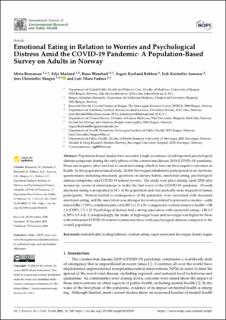| dc.contributor.author | Bemanian, Mitra | |
| dc.contributor.author | Mæland, Silje | |
| dc.contributor.author | Blomhoff, Rune | |
| dc.contributor.author | Rabben, Åsgeir Kjetland | |
| dc.contributor.author | Arnesen, Erik Kristoffer | |
| dc.contributor.author | Skogen, Jens Christoffer | |
| dc.contributor.author | Fadnes, Lars Thore | |
| dc.coverage.spatial | Norway | en_US |
| dc.date.accessioned | 2021-04-08T10:55:34Z | |
| dc.date.available | 2021-04-08T10:55:34Z | |
| dc.date.created | 2021-02-24T15:03:19Z | |
| dc.date.issued | 2020-12 | |
| dc.identifier.citation | Beamanian, M., Mæland, S., Blomhoff, R. et al. (2020) Emotional Eating in Relation to Worries and Psychological Distress Amid the COVID-19 Pandemic: A Population-Based Survey on Adults in Norway. International Journal of Environmental Research and Public Health, 18(1), 130 | en_US |
| dc.identifier.issn | 1661-7827 | |
| dc.identifier.uri | https://hdl.handle.net/11250/2736852 | |
| dc.description.abstract | Population-based studies have revealed a high occurrence of self-reported psychological distress symptoms during the early phases of the coronavirus disease 2019 (COVID-19) pandemic. Stress and negative affect can lead to emotional eating, which in turn can have negative outcomes on health. In this population-based study, 24,968 Norwegian inhabitants participated in an electronic questionnaire including structured questions on dietary habits, emotional eating, psychological distress symptoms, and COVID-19-related worries. The study took place during April 2020 after around six weeks of interventions to tackle the first wave of the COVID-19 pandemic. Overall, emotional eating was reported in 54% of the population and was markedly more frequent in female participants. Worries related to consequences of the pandemic were associated with increased emotional eating, and the association was stronger for worries related to personal economy—odds ratios (OR) 1.7 (95% confidence interval (CI95%) 1.5–1.9)—compared to worries related to health—OR 1.3 (CI95% 1.2–1.5). Psychological distress had a strong association with emotional eating—OR 4.2 (CI95% 3.9–4.4). Correspondingly, the intake of high-sugar foods and beverages was higher for those with substantial COVID-19-related worries and those with psychological distress compared to the overall population. | en_US |
| dc.language.iso | eng | en_US |
| dc.publisher | MDPI | en_US |
| dc.rights | Navngivelse 4.0 Internasjonal | * |
| dc.rights.uri | http://creativecommons.org/licenses/by/4.0/deed.no | * |
| dc.subject | stress | en_US |
| dc.subject | stress-spising | en_US |
| dc.subject | trøstespising | en_US |
| dc.subject | Covid-19 | en_US |
| dc.subject | pandemi | en_US |
| dc.subject | mental helse | en_US |
| dc.subject | psykisk helse | en_US |
| dc.title | Emotional Eating in Relation to Worries and Psychological Distress Amid the COVID-19 Pandemic: A Population-Based Survey on Adults in Norway | en_US |
| dc.type | Peer reviewed | en_US |
| dc.type | Journal article | en_US |
| dc.description.version | publishedVersion | en_US |
| dc.rights.holder | (©) by the authors, 2020 | en_US |
| dc.subject.nsi | VDP::Samfunnsvitenskap: 200::Psykologi: 260::Klinisk psykologi: 262 | en_US |
| dc.source.volume | 18 | en_US |
| dc.source.journal | International Journal of Environmental Research and Public Health (IJERPH) | en_US |
| dc.source.issue | 1 | en_US |
| dc.identifier.doi | 10.3390/ijerph18010130 | |
| dc.identifier.cristin | 1893282 | |
| dc.source.articlenumber | 130 | en_US |
| cristin.ispublished | true | |
| cristin.fulltext | original | |
| cristin.qualitycode | 1 | |

